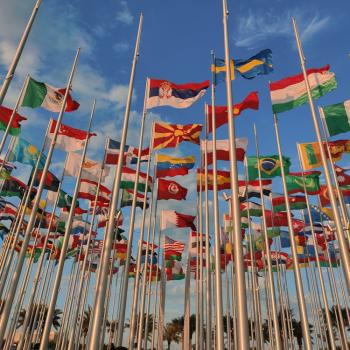 In the epistle to the Romans, St. Paul references Psalm 14, where the Psalmist declared: “The LORD looks down from heaven upon the children of men, to see if there are any that act wisely, that seek after God. They have all gone astray, they are all alike corrupt; there is none that does good, no, not one” (Ps. 14:2-3 RSV). Thus, we read in Paul:
In the epistle to the Romans, St. Paul references Psalm 14, where the Psalmist declared: “The LORD looks down from heaven upon the children of men, to see if there are any that act wisely, that seek after God. They have all gone astray, they are all alike corrupt; there is none that does good, no, not one” (Ps. 14:2-3 RSV). Thus, we read in Paul:
What then? Are we Jews any better off? No, not at all; for I have already charged that all men, both Jews and Greeks, are under the power of sin, as it is written: “None is righteous, no, not one; no one understands, no one seeks for God. All have turned aside, together they have gone wrong; no one does good, not even one” (Rom. 3:9-12 RSV).
It is very common to read into Paul’s sentiment an individualistic interpretation of the text, making the emphasis as being how each and every person is a sinner, and therefore, all have turned away from God, following their particular inordinate desires instead of God. There is, to be sure, some truth to this, but only because it can be seen as a result of the real argument which Paul was making in the text. Paul was not speaking of individuals, but of nations and similarly large groups of peoples. He was indicating that there will be no nation, no group of people which can be shown to be perfectly righteous and perfectly follow God’s will for them. No nation can be said to be righteous and so seen as great because of their nationalistic identity. This was especially important for Paul as he was interested in showing the equality of Jews with Gentiles in regards to the Christian faith: the Jews, though they were heirs of a great legacy and were given the oracles of God, did not fulfill the greatness which had been granted to them. They, like the Gentiles, have a history of turning against God, of sinning, and so as a people, even if they might have some relative greatness in their history which must not be rejected, they should not boast of themselves, thinking themselves superior to Gentiles:
Then what advantage has the Jew? Or what is the value of circumcision? Much in every way. To begin with, the Jews are entrusted with the oracles of God. What if some were unfaithful? Does their faithlessness nullify the faithfulness of God? By no means! Let God be true though every man be false, as it is written, “That thou mayest be justified in thy words, and prevail when thou art judged” (Rom. 3:1-4 RSV).
Paul was clear that the Jews, because of their history, brought to the world a great legacy which they could point to and use to show their special relationship with God. The problem is that they did not live up to that legacy. All have sinned – all nations, all peoples, Jew or Gentile, have nothing to boast because all of them have a history of turning away from God. Zll have fallen away from the glory God intended for them. Only in and through Jesus is righteousness capable of being rendered to us, a righteousness which ties us together and overcomes all nationalistic ideologies:
But now the righteousness of God has been manifested apart from law, although the law and the prophets bear witness to it, the righteousness of God through faith in Jesus Christ for all who believe. For there is no distinction; since all have sinned and fall short of the glory of God, they are justified by his grace as a gift, through the redemption which is in Christ Jesus (Rom. 3:21-24 RSV).
The context of Paul’s statement, therefore, tells us that he is speaking against all kinds of nationalistic ideologies which seek to glorify themselves as they pit themselves against all others peoples. The people of Israel truly had something special granted to them through Moses, but it was still merely an image and shadow of the glory which was to come in Jesus. Salvation is from the Jews, so there certainly is something important with their history, but it does not render the Jews greater than others. Likewise, people today might think their nation is great because of various parts of their history and figures in that history they like to honor, but they need to be reminded of the greatness of their nation’s sins, not only in the present age, but in the past. They need to recognize that despite all self-glorification given by nationalistic propaganda, all nations have within their history a lot of wickedness which must be repudiated. Any nation seeking to glorify themselves will fail to attain such glory; they cannot overcome evil by their apparent greatness, no matter how great they think they are. The more they prop themselves up and think of themselves as superior to others, the greater the likelihood that great wickedness will come into play and be accepted as a part of such nationalistic greatness. Those who seek to greatness must seek righteousness, and that can never be found in the embrace of nationalism; only by overcoming nationalism will true glory be found.
Origen, in the first extant commentary we possess on Paul’s epistle to the Romans, focused on this rejection of nationalistic idolatry as the important point of this passage of Scripture:
But if all are under sin, consequently there shall be no grounds for the self-exaltation of one group against the other one since both come to salvation not on the basis of their own righteousness, but on the basis of God’s mercy.[1]
If we truly want to understand what it means to say no one is righteous and all have sinned before God, we must look at this within the context of nationalistic communities, and their desire to be seen as greater than anyone else. No one will be great. No one will be righteous. Nationalism itself is founded upon many kinds of sin, including, and especially, pride. To embrace nationalism is to reject true greatness. Nationalism seeks to divide up humanity and destroy its commonality, to think some people are worth more than others from mere accidents. By realizing that no matter where one is born and raised, sin abounds, and destroys the people within, we can counter the claims of supremacy which nationalism brings out, and so destroy the pride which seeks to destroy others. True greatness is found in the embrace of the whole of humanity, in the human family, as we come together as brothers and sisters who love each other and seek not the best for ourselves alone, but for all.
Paul recognized that God had shared some of his glory with Israel. He said that they had an advantage in the fact that they had the oracles of God. He loved his people and their history. Rejecting nationalism does not mean we need to reject our people, or the love we can have for our people; but that love must be moderated love; it has to be a love which is inclusive of others, not exclusive to our people alone. We can love where we come from, but we must recognize and repudiate the failings of our ancestors as well as recognize and accept the greatness of the ancestors of others. We must never extend hatred towards others. We must never find excuses to degrade them. They have something great in their history to share, something which we lack. We need each other to be made whole.
Our love for our people, for our nation, must therefore be a realistic love, one which recognizes that there was no great golden age in the past which was pure and without problems. In all times, in all places, unrighteousness can be found; in all times and places, no group has been found to live so righteously that they are to be propped up and glorified. No group is to be idolized. No nation is to be emulated without caution. Nationalism, with its pride, ignores the sin, letting the sin of the past return with vigor because it is often seen as a part of what made the nation great in the past. We cannot repeat the past. We must move on, constantly reforming ourselves, making ourselves better, not through pride, but through righteousness, with all the obligations such righteousness entails. We must seek for justice for those who suffer from the sins of the past while bringing mercy and charity to all so that all can be made greater together.
All have sinned. We are in this together. No group, no nation can boast about their past and say they are greater than any others. All have fallen short. This is the message which Scripture gives to us so that we can root out the sin of nationalism. Let us heed the wisdom of Paul and remember it so we do not fall into temptation when populists promote nationalism as a way to make their nation great again. All they would bring to us is another fall from grace.
[IMG=Last Judgment by Fra Angelico [Public domain] via WikimediaCommons]
[1] Origen, Commentary on the Epistle to the Romans Books 1-5. Trans. Thomas P. Scheck (Washington, DC: CUA Press, 2001), 188.
Stay in touch! Like A Little Bit of Nothing on Facebook












